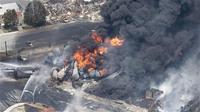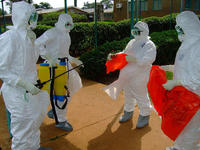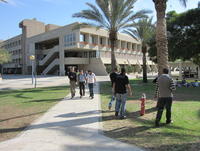-
Petroleum industry, railroads want deadline extension for phasing out old tank cars

Transportation of crude oil by train jumped to 408,000 in 2013, from 11,000 in 2009, partly due to the rise in production from North Dakota’s Bakken region, where oil production has surpassed pipeline capacity. The increasing use of rail to transport crude oil has resulted in several accidents. The Department of Transportation want to phase out older tank cars — because they have thinner shells and are thus more vulnerable to accidents when transporting flammable liquids like crude oil – and replace them with new, safer tank cars with thicker shells. The petroleum industry and U.S. railroads want DOT to extend the deadline for phasing out old tankers from two years to four years.
-
-
FDA, industry face pressures to ensure safety of food ingredients
Confusion over a 1997 Food and Drug Administration (FDA) rule that eases the way for food manufacturers to use ingredients “generally regarded as safe,” or GRAS, has inspired a new initiative by food makers. Food safety advocates say the current GRAS process allows substances into the food supply that might pose a health risk, while industry defends its record.
-
-
New cyber initiative to put Israel’s Beer-Sheva region on the world’s cyber map
Ben-Gurion University of the Negev is a central component of the new CyberSpark initiative, an ecosystem with all the components which will allow it to attain a position of global leadership in the cyber field. The CyberSpark initiative is the only complex of its type in the world – a government-academic-industry partnership which includes Fortune 500 companies and cyber-incubators, academic researchers and educational facilities, as well as national government and security agencies. The CyberSpark Industry Initiative will serve as a coordinating body for joint cyber industry activities with government agencies, the Israel Defense Force (IDF), and academia.
-
-
U.S. hospitals unprepared to dispose of Ebola-related waste

A board of biological safety experts has warned that many U.S. hospitals may be unprepared to dispose of Ebola-related waste safely, should the disease arrive in any great number within the mainland. Many waste management companies are refusing to perform any service where waste items – such as soiled sheets and medical protective gear involved with treating the disease – would have to be handled. They cite federal guidelines which state that such items would require special training and packaging by people with hazardous materials training.
-
-
California agriculture faces greatest water loss ever seen
California produces nearly half of U.S.-grown fruits, nuts, and vegetables, and nearly a quarter of the nation’s milk and cream. Across the nation, consumers regularly buy several crops grown almost entirely in California, including tomatoes, carrots, broccoli, almonds, walnuts, grapes, olives, and figs. Researchers show that California agriculture is weathering its worst drought in decades due to groundwater reserves, but the nation’s produce basket may come up dry in the future if it continues to treat those reserves like an unlimited savings account.
-
-
A first: Jury finds bank guilty of financing terrorism
In a major development on the terrorism financing front, a U.S. jury found Arab Bank Plc liable for providing material support to Hamas and ordered the bank to compensate nearly 300 Americans who are either victims or relatives of victims of at least two dozen attacks tied to Hamas in Israel and the Palestinian territories.
-
-
Reduce river pollution through water-quality trading
Allowing polluters to buy, sell, or trade water-quality credits could significantly reduce pollution in river basins and estuaries faster and at lower cost than requiring the facilities to meet compliance costs on their own, a new study finds. The scale and type of the trading programs, though critical, may matter less than just getting them started.
-
-
Ten years after Hurricane Ivan, Alabama communities are better prepared
Since Hurricane Ivan struck Baldwin County, Alabama and neighboring communities ten years ago, building officials have adopted better resilience protocols to protect human life and property from future storms. Ivan, which left an estimated $14.2 billion in damages throughout the Gulf Coast, is considered the worst storm to hit Alabama in twenty-five years, and the seventh most costly hurricane ever to affect the United States.
-
-
$5 million for new cybersecurity building at Ben-Gurion University of the Negev

Ben-Gurion University of the Negev (BGU) is a central component of the new “CyberSpark” initiative, a multi-component cyber eco-system. It is the only complex of its type in the world which is a government-academic-industry partnership and includes Fortune 500 companies and cyber-incubators, academic researchers and educational facilities, as well as national government and security agencies. A $5 million contribution will underwrite construction of the building that will house the Cyber Security Institute.
-
-
Colorado recovering as it marks one year anniversary of devastating flood
On 29 September 2013 Colorado experienced the most severe natural disaster that had ever befallen the state. Within three days much of the state had experienced a rainfall equivalent to its total for the entire year. In the end, nine people died, nearly 1,000 were evacuated by helicopter, and 1,800 homes were destroyed. The total cost of the damage reached $2.9 billion. Now, a year later, Colorado is finally coming back.
-
-
Moving cybersecurity technologies from the lab to the real world more expeditiously
Through the Department of Homeland Security’s Transition to Practice (TTP) program, cybersecurity technologies developed at Sandia National Laboratories — and at other federal labs — now stand a better chance of finding their way into the real world. The TTP program, spearheaded by DHS Science and Technology Directorate (S&T), helps move federally funded cybersecurity technologies into broader use. Getting research discoveries and new technologies over the so-called “valley of death” — the gap between early, promising research on one side and technology that’s in use on the other — is a pressing need in the national lab community.
-
-
Start-ups offer apps which help people cope with disasters
Open data policies which allow government agencies to share public information with citizens and the private sector have made California welcoming to startups dedicated to helping communities recover following a disaster.For example: Appallicious offers an app which allows subscribed cities and towns to select from hundreds of data sets, then share with the public, information on evacuation routes, current hazards, and location of critical resources.BlueLine Grid allows public employees from different agencies to communicate with each other during a crisis.SeeClickFix is connecting residents to their local government.
-
-
Johnson & Johnson accelerates Ebola vaccine program
Johnson & Johnson last week announced it will fast-track the development of a promising new combination vaccine regimen against Ebola and collaborate with its partners to address the current Ebola outbreak. The accelerated vaccine program features a prime-boost regimen, in which one vector is used to prime and the other to boost the immune response. It consists of two vaccine components that are based on AdVac technology from Crucell N.V.(part of the Janssen pharmaceutical companies of Johnson & Johnson, based in the Netherlands) and the MVA-BN technology from Bavarian Nordic (a biotech company, based in Denmark).
-
-
Retailers spend less on cybersecurity than other industries, and it shows
Cybersecurity analysts say that retailers are spending less on cybersecuirty measures than banks and healthcare providers. Retailers spend 4 percent of their IT budgets on cybersecuirty, while financial services and healthcare providers spend 5.5 percent and 5.6 percent, respectively. On cybersecurity spending per employee, the banking and finance industries spend roughly $2,500 per employee, while retailers invest about $400 per employee. On Tuesday, Home Depot became the latest retailer to investigate a potential major breach of customer credit or debit card data.
-
-
Virginia welcomes cybersecurity start-ups to a state-backed business accelerator
Earlier this week, MACH37, a business accelerator for cybersecurity start-ups in Virginia, welcomed a new group of companies one year after it was launched to help establish the state as a hub for cybersecurity firms. The three-month program, funded with state money, offers a $50,000 investment and access to a network of mentors to companies that can turn their ideas into viable businesses.
-
More headlines
The long view
Factories First: Winning the Drone War Before It Starts
Wars are won by factories before they are won on the battlefield,Martin C. Feldmann writes, noting that the United States lacks the manufacturing depth for the coming drone age. Rectifying this situation “will take far more than procurement tweaks,” Feldmann writes. “It demands a national-level, wartime-scale industrial mobilization.”
Trump Is Fast-Tracking New Coal Mines — Even When They Don’t Make Economic Sense
In Appalachian Tennessee, mines shut down and couldn’t pay their debts. Now a new one is opening under the guise of an “energy emergency.”
Smaller Nuclear Reactors Spark Renewed Interest in a Once-Shunned Energy Source
In the past two years, half the states have taken action to promote nuclear power, from creating nuclear task forces to integrating nuclear into long-term energy plans.
